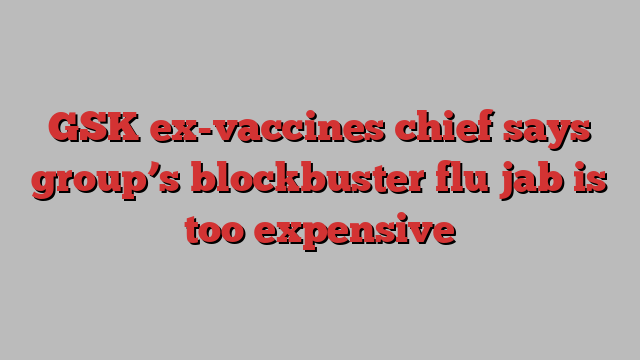
Stay informed with free updates
Simply sign up to the Pharmaceuticals sector myFT Digest — delivered directly to your inbox.
GSK’s ex-head of vaccines says its blockbuster jab for a flu-like virus that spreads in the autumn and winter is too expensive and difficult to use after raising $100mn for a rival start-up to develop an alternative drug.
Emmanuel Hanon, who led development of GSK’s vaccine for respiratory syncytial virus (RSV) until he left in 2021, said jabs made by the British drugmaker, Pfizer and Moderna are “really, really cumbersome” and “not cost-effective”.
The first RSV vaccines were approved in the US in May last year. GSK’s Arexvy vaccine generated more than $1bn in sales in about nine months, surpassing Pfizer’s rival shot Abrysvo.
Moderna has also released a vaccine based on its mRNA technology, which was also used to develop its Covid-19 vaccine, but this product provides shorter-lasting protection.
GSK and Pfizer were dealt a blow in June when US health officials did not recommend expanding the use of their vaccines because of concerns over cost-effectiveness and rare side-effects. Arexvy’s list price is $280 per dose, while Abrysvo’s is $295.
The decision by US officials has limited the potential market for the jabs and in July data provider Airfinity reduced its predictions for the US market for RSV in elderly adults from $4.7bn a year by 2030 to $1.7bn.
But FTSE 100 listed GSK has said it remains confident of hitting a peak of £3bn in annual sales and will publish longer-term data on the product’s efficacy and durability later this year as part of efforts to expand its use.
Hanon’s start-up Vicebio recently raised $100mn in funding to develop a rival vaccine that would also protect against human metapneumovirus (HMPV), a virus that usually causes symptoms similar to a cold.
The fundraising was led by TCGX, alongside Goldman Sachs Alternatives, Avoro Ventures and venBio.
The joint RSV-HMPV vaccine would come in a pre-filled syringe, instead of existing jabs that come in two vials that must be mixed together before delivery.
These vaccines are more costly and difficult for medical staff to deliver than pre-filled products, making them “not easy to use”, he said.
The joint vaccine could be better value for money than Arexvy or Abrysvo, he added. The company will also explore protecting against a third respiratory virus, parainfluenza virus 3.
However, Hanon’s RSV and HMPV vaccine, which will be tested against GSK’s Arexvy jab using the $100mn funding, will not be on the market for many years in a long road towards regulatory approval.
It has only recently entered early stage trials, which the company must complete to show its efficacy and safety. It will then go forward to late-stage, phase 3 trials, which Hanon hopes will be by 2027 when more financing would be required.
“In the vaccine space, you don’t have to be first but you have to be best,” said Giovanni Mariggi, chair of Vicebio and a partner at founding investor Medicxi.
Hanon’s attempts to develop another RSV vaccine come after he spent 20 years at GSK. He left the company after the drugmaker opted not to develop its own vaccine for Covid-19.
Instead, it chose to supply other makers with its adjuvant, an ingredient that can be added to vaccines to boost immune response.
The decision was made despite GSK’s historic expertise in vaccines. Sanofi used the GSK adjuvant, but the drugmakers were not able to create an approved vaccine until 2022.
Asked about the company’s move, Hanon said: “Look, was that the wrong decision? On the other hand, GSK got an RSV vaccine on time. So I think it’s difficult to quantify, good or wrong.”
GSK declined to comment.